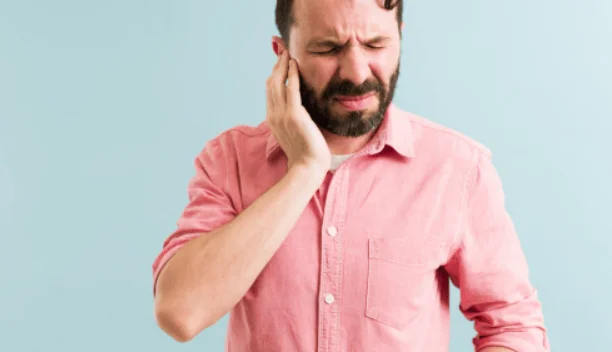Experiencing fluttering in the left ear can be both perplexing and concerning. This article aims to demystify the reasons behind ear fluttering, focusing on the left ear. Here, we delve into the various causes, symptoms, and treatments associated with this condition, aiming to provide comprehensive and trustworthy information.
Why is My Left Ear Fluttering? While fluttering in the left ear can be a nuisance, it’s often not a serious condition. Understanding its causes, such as tinnitus, Eustachian tube dysfunction, or myoclonus, is crucial for effective management. Tinnitus, characterized by ringing or fluttering noises in the ears, can affect either ear but may manifest more prominently in one. Eustachian tube dysfunction, responsible for regulating ear pressure, can lead to fluttering sensations when imbalanced. Myoclonus, a condition involving involuntary muscle contractions, may result in ear spasms.
1. Tinnitus: A Common Culprit
Tinnitus is often associated with a fluttering sensation in the ear. It’s characterized by hearing sounds that have no external source, such as buzzing, clicking, or the fluttering sound itself. Studies indicate that 8% to 25.3% of people in the United States experience tinnitus in some form.
Understanding Tinnitus
- Symptoms: These can range from throbbing and ticking to the sensation of fluttering or whooshing.
- Causes: Tinnitus can stem from ear dysfunctions like tumors, Meniere’s disease, hearing loss, or exposure to loud noises.
Managing Tinnitus
- Behavioral Therapy: Helps in reducing attention to the sounds.
- Hearing Aids: Beneficial if tinnitus is related to hearing loss.
- Medication: Includes antidepressants and antianxiety drugs.
2. Middle Ear Myoclonus (MEM)

Myoclonus in the middle ear, a form of tinnitus, is characterized by involuntary muscle contractions causing fluttering sounds.
Diagnosing MEM
- Tympanometry: This test checks the function of the middle ear and eardrum mobility.
Treatment Options
- Medication: Benzodiazepines and carbamazepine are used.
- Surgery: Tympanectomy might be recommended in some cases.
3. Eustachian Tube Dysfunction
The eustachian tube regulates air pressure and ear health. Dysfunctions can lead to muffled hearing and a feeling of fullness in the ear.
Symptoms and Causes
- Symptoms: Include reduced hearing, balance problems, and a full feeling in the ear.
- Causes: Often stem from respiratory infections, allergies, tumors, or ear injuries.
Non-Surgical Treatments
- Nasal Douching: Can help relieve symptoms.
- Medication: Decongestants and antibiotics might be prescribed.
4. Hypothyroidism and Ear Health
Hypothyroidism, characterized by insufficient thyroid hormone production, can also affect ear health, leading to symptoms like tinnitus and hearing loss.
Impact on Ear Health
- Symptoms: Fatigue, weight gain, cold intolerance, vertigo, and tinnitus.
- Treatment: Thyroxin supplementation can reduce symptoms.
5. High Blood Pressure and Ear Health

High blood pressure can adversely affect hearing and lead to tinnitus.
Understanding the Connection
- Research Findings: A significant percentage of people with tinnitus have high blood pressure.
- Treatment: Focuses on managing blood pressure to prevent hearing loss.
6. The Role of Earwax
Accumulated earwax can cause a fluttering sensation, along with hearing impairment.
Symptoms and Treatment
- Symptoms: Earache, partial hearing loss, and tinnitus.
- Treatment: Professional earwax removal is recommended.
7. Dietary Factors Influencing Ear Spasms
Diet can play a role in ear health, particularly in conditions like tinnitus or ear spasms. Certain foods or deficiencies in diet can exacerbate symptoms.
Nutritional Impact
- Vitamins and Minerals: Deficiencies in magnesium, zinc, or B vitamins can impact ear health.
- Caffeine and Alcohol: These substances can sometimes worsen symptoms.
Dietary Adjustments
- Balanced Diet: A diet rich in fruits, vegetables, and whole grains can support overall ear health.
- Hydration: Adequate water intake is essential for maintaining ear and general health.
8. Stress-Related Ear Symptoms

Stress is a significant factor that can contribute to or worsen ear fluttering symptoms, particularly in cases related to tinnitus or myoclonus.
Understanding the Connection
- Physiological Impact: Stress can exacerbate ear muscle spasms and tinnitus.
- Psychological Aspect: Anxiety and stress can heighten the perception of ear fluttering.
Stress Management Techniques
- Relaxation Practices: Techniques such as meditation and yoga can help.
- Counseling: Professional help can be beneficial in managing stress.
9. Neurological Causes of Ear Twitching
In some cases, ear fluttering can be linked to neurological issues. While rare, it’s important to be aware of this possibility.
Potential Neurological Links
- Neurological Disorders: Conditions like multiple sclerosis or brainstem issues can cause ear symptoms.
- Nerve Damage: Trauma or injury to nerves around the ear can result in twitching.
10. Temporary Tinnitus and Ear Fluttering
Tinnitus and ear fluttering can sometimes be temporary, often linked to specific triggers or temporary conditions.
Common Temporary Causes
- Loud Noise Exposure: Temporary tinnitus can occur after exposure to loud sounds.
- Ear Infections: These can cause temporary fluttering or ringing.
11. Ear Fluttering in Adults vs. Children
The occurrence and causes of ear fluttering can vary between adults and children, often linked to different underlying issues.
Pediatric Considerations
- Common Causes in Children: Ear infections and Eustachian tube issues are more common.
- Monitoring: Children with persistent symptoms should be evaluated by a pediatrician.
FAQs:
What causes fluttering in the left ear?
Causes include tinnitus, Eustachian tube dysfunction, middle ear myoclonus, and sometimes conditions like hypothyroidism or high blood pressure.
When should I see a doctor for ear fluttering?
If fluttering is persistent, accompanied by hearing loss, or significantly affects your quality of life, a consultation is recommended.
Can stress cause fluttering in the ear?
Yes, stress can exacerbate or trigger tinnitus, which might present as fluttering in the ear.
Is fluttering in the ear serious?
Typically, it’s not serious but can impact your quality of life and should be evaluated if persistent.
How is ear fluttering treated?
Treatment depends on the cause and can include medication, therapy, or in some cases, surgical interventions.
Also Read: Amanda Riley Blog
Conclusion
Treatments vary based on the underlying cause, ranging from lifestyle changes and medication to, in some cases, surgery. For tinnitus, therapies like sound masking or cognitive behavioral therapy might be recommended.
Eustachian tube dysfunction may benefit from decongestants, while myoclonus might require muscle relaxants. If you find yourself wondering, “Why is My Left Ear Fluttering?” and experience persistent or bothersome symptoms, consulting a healthcare professional is advisable. They can conduct a thorough examination, possibly including imaging tests, to pinpoint the precise cause and recommend an appropriate course of action. Taking proactive steps towards understanding and addressing the issue can lead to effective relief and improved ear health.
